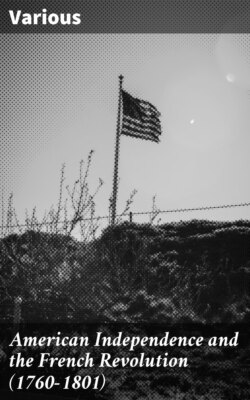Читать книгу American Independence and the French Revolution (1760-1801) - Various - Страница 15
На сайте Литреса книга снята с продажи.
Robert Wood to Sir J. Fielding.
ОглавлениеTable of Contents
5 and 6 April.—Lord Weymouth has been informed that Mr. Stuart, the wine merchant, upon application to you for assistance against the mob on the night of the illumination, had not met with that support which he had reason to expect from the civil magistrate. Though this account does not agree with what his Lordship had conceived of your vigilance and activity, yet he has ordered me to acquaint you with it, and to add that though, on the one hand, he relies much on your zeal, and is ready to do justice to your diligence at the time of the late riotous proceedings, yet, on the other, he thinks it his indispensable duty to take notice of any remissness in a magistrate upon whom so much of the public order and tranquillity depends; and if Mr. Stuart’s account of this matter be founded, his Lordship desires that I will let you know it will very much change that favourable opinion which he wishes to preserve of you. His Lordship thinks it would be unfair towards you as well as to the public to keep this matter from you, though Mr. Stuart has not given it in as matter of formal complaint, but merely for the Secretary of State’s information. Lord Weymouth is willing to suppose there must be some mistake in what he has heard.
P.S.—As Lord Weymouth had taken every precaution that could be imagined in order to support magistracy and give weight to your proceedings, he is disappointed to find that there should be any complaint; and though he despises clamour, he must pay attention to facts urged by a citizen of character; and I heartily wish you may put it in his power to set you clear of imputation, which is his wish also.
The reply to this letter is dated the 5th.
Sir John Fielding gives a history of the transactions of the night, and says that, to the best of his knowledge, and to the best of his abilities, with unwearied attention, diligence, and application, he has done everything in his power to preserve peace and good order, and to detect offenders and bring them to justice, from the beginning to the conclusion of the late unhappy disturbances. Is sincerely concerned if in any respect Mr. Steward mistook his meaning, and more so that Lord Weymouth should be dissatisfied with his conduct as a magistrate. Unfortunate he has always been; at present particularly so, when his warmest endeavours to discharge a public trust with loyalty to his Sovereign, fidelity to his country, and obedience to his superiors, have been so far ineffectual as not to secure him the confidence of those by whom he would wish to be approved.—Bow Street.
